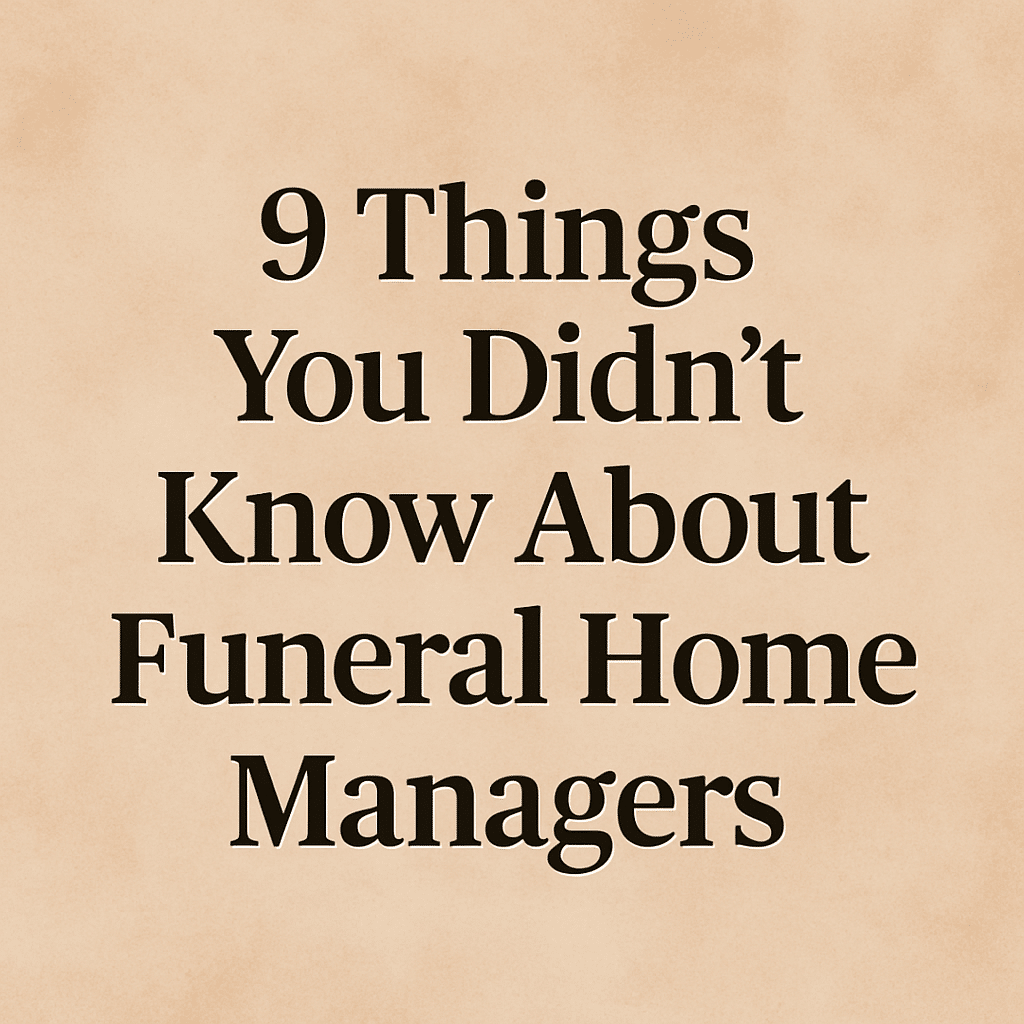When families walk into a funeral home, they notice the flowers, the calm environment, and the respectful tone. What they don’t always see is the person quietly making sure every detail is in place, every staff member is supported, and every family is cared for. That person is often the funeral home manager.
If you think this role is just about keeping track of the schedule or handling complaints, think again. Here are nine things you probably didn’t know about funeral home managers.
1. They Manage the Entire Facility, Not Just the Services
While funeral directors often focus on the arrangement of services, funeral home managers are responsible for the entire operation. That means everything from building maintenance and staff schedules to compliance and customer service.
They need to keep the home clean, welcoming, and operational at all times, whether it’s a small family-owned space or a large, multi-service facility.
2. They Balance Business Savvy With Compassion
Yes, funeral homes are businesses. And funeral home managers have to keep an eye on budgets, payroll, vendor contracts, and profitability. But unlike typical business managers, they’re also working in a space where emotions are high and empathy matters.
They have to know how to read the room, comfort families, and coach staff through difficult conversations while still making financially responsible decisions.
3. They Lead a Diverse Team With a Common Purpose
A funeral home manager may oversee funeral directors, apprentices, embalmers, greeters, administrative staff, and transport drivers. Everyone on that team plays a role in delivering a meaningful experience, and it’s the manager’s job to keep the team aligned and motivated.
Strong leadership skills are a must. So are time management, conflict resolution, and the ability to jump in when something goes wrong.
4. They Handle the Unexpected Daily
Power outage during a service? Delayed casket delivery? Family members arriving in separate cars with very different opinions? Funeral home managers are used to navigating unpredictable challenges without missing a beat.
Their job often involves solving problems quickly and quietly so that the grieving family never has to feel the disruption.
5. They Must Stay Compliant With State and Federal Laws
Funeral home managers need to be fluent in everything from OSHA requirements to funeral licensing regulations. They’re often responsible for ensuring the facility passes inspections, that embalming or cremation protocols are followed correctly, and that all documentation is completed legally.
One small misstep can lead to legal trouble or damage the reputation of the funeral home. Staying compliant is not optional.
6. They Often Step Into Client-Facing Roles Too
While they spend much of their time behind the scenes, funeral home managers frequently meet with families. They may support arrangements when staff is limited, explain pricing and service options, or step in during particularly sensitive situations.
The best managers are both operational leaders and compassionate communicators, ready to do what’s needed in the moment.
7. They’re Responsible for the Funeral Home’s Reputation
Every Google review, word-of-mouth referral, or complaint ties back to how well the funeral home is run. A good manager knows how to set a standard for care, respond to issues quickly, and create a workplace culture that puts families first.
They’re not just preserving a business. They’re preserving trust in a community resource during people’s most vulnerable times.
8. They Often Juggle More Than One Location
In many companies, especially those that are part of a larger network, funeral home managers may be responsible for multiple locations. That means coordinating staffing across sites, maintaining multiple properties, and making sure service standards are consistent.
It’s a high-stakes balancing act that requires organization, delegation, and strong communication.
9. Most People Don’t Know They Exist—Until There’s a Problem
When everything goes smoothly, most families never know a funeral home manager was involved at all. But when something falls through the cracks, the manager becomes the person everyone looks to for answers and accountability.
They’re the calm in the storm, the fixer, and often the quiet reason a difficult day went better than expected.
Final Thought: A Behind-the-Scenes Role With Frontline Impact
Funeral home managers are the backbone of the funeral profession. They’re not just running a building—they’re building trust. They make sure teams function, families are supported, and every farewell is delivered with dignity.
If you’ve ever walked into a well-run funeral home and felt immediately at ease, you can thank the person in charge behind the scenes. Their leadership might not be visible, but its impact is felt by every family they serve.
If you have feedback, questions, or ideas for future articles or Information Hubs, please contact us. Your insights help us create valuable content.


